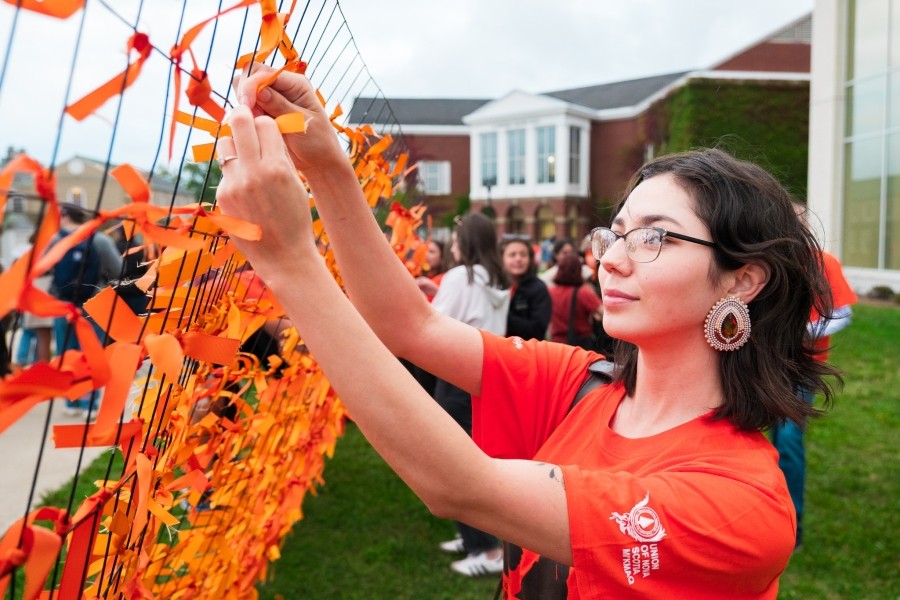
Editor’s Note: As we celebrate Mi’kmaw History Month in October, we’re proud to spotlight some of our own people, Indigenous culture, contributions and history.
Maria Young grew up in Eskasoni First Nation in Unama'kik or Cape Breton, NS and is in her second year at StFX, taking an honours BA in Applied Forensic Psychology. Ms. Young has already received a prestigious RBC Foundation Undergraduate Student Research Award and has been working to document the history, function, and promising practices of the Wagmatcook Court, which incorporates Indigenous traditions and restorative concepts into its procedures. After her undergraduate degree, she plans to study Indigenous law.
What drew you to StFX? And to your program?
I’ve always been interested in psychology. I was just never sure if I wanted to pursue it as a career. In high school, I discovered what forensic psychology was and I immediately knew that’s what I wanted to do. I remember searching up “forensic psych programs in Canada” and StFX being one of the results. I took a tour of StFX and fell in love with the campus and it was close to home. It just felt right and that gut feeling sort of solidified my choice in coming here.
What’s your experience been like?
There are ups and downs that come with leaving your community for the first time. At first, I felt disconnected from my culture but my passion for sharing my culture and educating others has helped me feel more connected to my Indigenous identity. It helps that there’s a small but strong Indigenous community here on campus. I’ve made some really great friends so far and it’s easy to get involved. StFX has provided me with so many opportunities such as the research I’ve done over the summer. I’ve also been really enjoying my courses and have taken some really fun and interesting electives. I feel as though the professors here really care about you and your success as a student.
Do you have a career in mind after StFX?
My current plan is to go to law school after my undergraduate and study Indigenous law.
Could you tell me a bit about yourself?
This year I’m one of the Indigenous student peer mentors here on campus, which has been lots of fun. I love being able to support other Indigenous students. It’s really fulfilling. In my spare time I enjoy spending time with my friends. I also enjoy photography, filmmaking, collecting CDs, and playing video games.

You are doing research work with anthropology professor Dr. L. Jane McMillan. Tell us about that.
So, the focus of the research is to document the history, function, and promising practices of the Wagmatcook Court. The courthouse sits in Wagmatcook First Nation and incorporates Indigenous traditions and restorative concepts into its procedures to better meet the needs of the Indigenous peoples attending the court. One of the goals of my research project is to assess the difference culturally relevant legal processes can make for Indigenous clients. This research project is very special to me as I believe it can contribute to a solution to the over-representation and mistreatment of Indigenous peoples in the Canadian justice system. It has also given me incredible first-hand experience in conducting research and much more confidence in my own capabilities as an academic. I think this research is something I can build off of and continue to develop throughout my education.
As we celebrate Mi’kmaw History Month, how important is it that we shine a spotlight on the culture and history?
It is so important. Since the beginning of colonization hundreds of years ago, attempts to erase our people and culture have occurred time and time again. Colonialism in this country is ongoing and something we continue to fight against. Acknowledging our history means acknowledging the hardships our people have endured and continue to endure (hardships such as centralization, Residential and Indian Day Schools, and the current epidemic of missing and murdered Indigenous women and 2-spirited people, just to name a few). This month is also a celebration of our culture, resilience, and strength. It’s a reminder of our inherent rights as Mi’kmaw people, rights that the government still often fails to acknowledge. Overall, Mi’kmaw History Month is about education, building awareness, and revitalizing our culture.
Is there anything you’d recommend people do to learn more?
My advice is to be open to listening, be open to learning, and be open to change. Talk to Indigenous people, go to Indigenous events on campus, they’re almost always open to anyone. Don’t be afraid to ask questions, don’t be afraid to admit you don’t know or understand something. Learn about the violent settler colonial history of the land you reside on and acknowledge the ways you may be benefiting from that history. Understand that doing these things may feel awkward or uncomfortable, but facing these feelings and educating yourself anyway is how you become a better ally.

